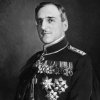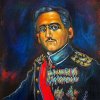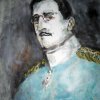Prince Alexander’s future changed in 1909, when his elder brother Prince George renounced the throne. Alexander as the new Crown Prince of Serbia immediately began reorganizing the Serbian army, and preparing for the ultimate battle against the Ottomans who still occupied part of the Balkans.
In the first Balkan War of 1912, HRH Crown Prince Alexander was commander of Serbia’s First Army, fought victorious battles in Kumanovo and Bitola, and later in 1913, during the second Balkan War he was victorious at the battle in Bregalnica. Crown Prince Alexander was the supreme commander of the Serbian army in World War I at the Cer and Kolubara battles in 1914, when the Serbian troops were victorious against the Austro-Hungarian army. Attacked by Austro-Hungary, Germany and Bulgaria, Serbia’s Army suffered a series of defeats in 1915. To insure its survival and ability to fight another day the Serbian army with the aged King Peter I and Crown Prince Alexander made a strategic withdrawal through Albania to the island of Corfu and there the Serbian Army was refitted and reorganized.
HRH Crown Prince Alexander became on 11 June 1916 the Regent of Serbia when King Peter I partially transferred his duties owing to ill health. After the army was regrouped and reinforced, it had a glorious victory at the Thessalonica Front, at Kajmakcalan. The Serbian army carried out the final operations of the Thessalonica breakthrough in the autumn of 1918, under the supreme command of the Regent Alexander, with superb commanding officers such as Field Marshals Zivojin Misic, Stepa Stepanovic and Petar Bojovic. Crown Prince Alexander’s military success during World War I was followed by his accomplishments as a statesman. After a decree of the National Assembly and the National Council in Zagreb, The Regent HRH Crown Prince Alexander proclaimed the unification of the Serbs, Croats and Slovenes into a single nation 1 December 1918.This act completed the dream of his father and grandfather – to unify Southern Slavs in one nation. When King Peter I died on 16 August 1921, the Regent HRH Crown Prince Alexander became the King of the Kingdom of the Serbs, Croats and Slovenes. In 1922, he married HRH Princess Maria of Romania. They had three sons – Crown Prince Peter, Prince Tomislav and Prince Andrej.
The Kingdom of the Serbs, Croats and Slovenes faced continuing crisis caused by severe conflicts between different political parties and ethnic groups. Due to an assassination in the National Assembly and the chaotic situation in the country, King Alexander I suspended the Constitution in 1929, changed the name of the state, from the Kingdom of the Serbs, Croats and Slovenes to the Kingdom of Yugoslavia. He also reorganized the state administration by establishing nine “banovinas” (provinces) named after major geographic features such as river valleys.
When the King estimated that the political turmoil in the country had calmed down, a new Constitution was proclaimed in 1931 (known as the “October Constitution”). The King firmly believed that the state crisis would be permanently resolved only when a Yugoslav nation was established, and King Alexander I tried to achieve that goal by implementing a policy “Yugoslav integralism”, which eventually failed.In foreign policy the King worked intensively on making defensive alliances against the forces that aimed at the revision of the Versailles Peace Treaty. The King’s first achievement was the “Small Entente” proclaimed in 1921 between the Kingdom of the Serbs, Croats and Slovenes, Romania and the Czech Republic. An alliance with France was established in 1927, and another one in 1934 included Yugoslavia, Romania, Turkey and Greece.
King Alexander I was assassinated in Marseilles 9 October 1934 along with the French Foreign Minister Monsieur Louis Barthou during a state visit to France. King Alexander had travelled to France with the aim to strengthen the defensive alliance against Nazi Germany. The King’s death deeply moved the whole of Yugoslavia, and hundreds of thousands of people paid their last respects all along the funeral route through the country to the royal crypt in Oplenac. King Alexander I was buried in the Mausoleum of the Church of St. George built by King Peter I. In recognition of his greatest accomplishments the National Parliament and the Senate of the Kingdom of Yugoslavia proclaimed him King Alexander I The Unifier.
Source: The Royal Family of Serbia







